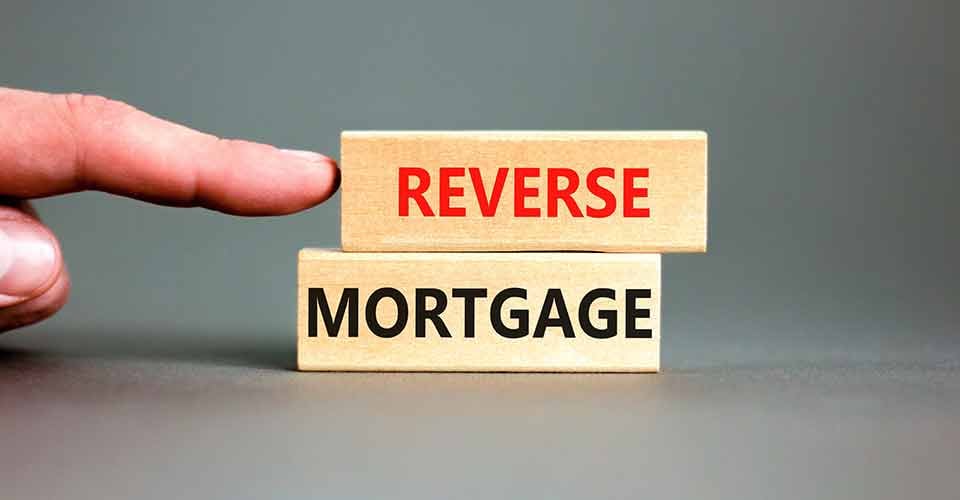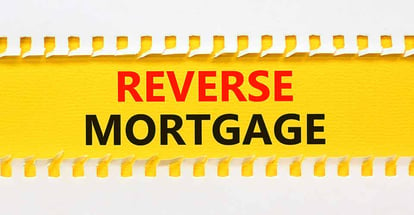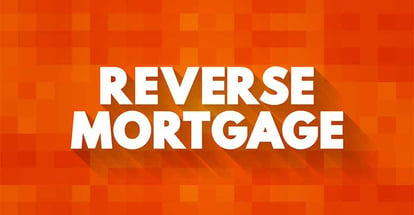Why Suze Orman is WRONG about Reverse Mortgages
Are you thinking about taking out a reverse mortgage? If so, you may have heard financial “expert” Suze Orman advising against doing so. But what she doesn’t tell her audience is that there are many reasons why a reverse mortgage could be beneficial to them and their financial future.
In this blog post, we're going to take a deep dive into the pros and cons of reverse mortgages by exploring both sides in an unbiased way.
By the end of it, we hope you will feel more informed and empowered to make your own decision regarding whether or not getting a reverse mortgage makes sense for YOU!
Are Reverse Mortgages a Scam?
What Suze Orman Says - Reverse mortgages can be costly for borrowers due to the inclusion of fees such as origination fees, mortgage insurance premiums, and closing costs, which can significantly impact the borrower's home equity.
The Facts
Reverse mortgages are designed to allow older homeowners to access the equity in their homes without having to sell or make monthly mortgage payments.
The fees associated with reverse mortgages are typically added to the loan balance and paid back when the loan becomes due, either when the homeowner sells the home, moves out of the home, or passes away.
This means that the borrower does not need to come up with the fees upfront or use their own funds to cover them, which may not significantly impact their home equity.
The fees associated with reverse mortgages may be outweighed by the benefits of having access to additional income or funds from the home equity.
For older Americans who may be struggling with retirement savings or have limited income options, a reverse mortgage could provide a valuable source of funds to cover living expenses, healthcare costs, or other financial needs.
Do Reverse Mortgages Restrict Your Freedom?
What Suze Orman Says - Reverse mortgages may not always be a flexible option for homeowners, as borrowers are required to continue paying property taxes, homeowners insurance, and home maintenance costs, which can pose challenges for older Americans on a fixed income.
The Facts
While it's true that borrowers are required to continue paying property taxes, homeowners insurance, and home maintenance costs, these requirements are in place to protect the borrower and the lender, and to ensure that the home is properly maintained.
However, there are several ways that borrowers can manage these costs and make reverse mortgages a flexible option:
-
Deferral or assistance programs - Many reverse mortgage borrowers have the option to defer property tax payments until the loan is repaid, or they can seek assistance through property tax relief programs available in their state. This can alleviate the immediate financial burden for older Americans on a fixed income.
-
Loan-funded insurance premiums - Borrowers can choose to have their homeowners insurance premiums paid through the reverse mortgage loan, eliminating the need for out-of-pocket expenses. This can provide convenience and flexibility in managing insurance costs.
- Budgeting and planning - Reverse mortgage lenders often provide financial counseling to borrowers to help them budget and plan for ongoing home maintenance costs. This can assist borrowers in effectively managing these expenses within their fixed income.
It's important to note that many older Americans who choose reverse mortgages are well-informed about the ongoing costs and are willing to accept them in exchange for the benefits they receive, such as access to home equity without monthly mortgage payments.
Reverse mortgages can provide financial flexibility for seniors, allowing them to age in place and maintain their independence.
Are Reverse Mortgages Risky?
What Suze Orman Says - Reverse mortgages can be a risky financial decision, especially for those who may need to move or sell their home in the future. If the home value decreases, the borrower may end up owing more than the home is worth, making it difficult to sell or move.
The Facts
Suze Orman's warning about reverse mortgages being a risky financial decision for homeowners who may need to move or sell their home in the future is based on valid concerns.
However, it's important to understand that reverse mortgages also have built-in safeguards to mitigate such risks, and there are strategies that homeowners can employ to manage potential challenges.
First, it's true that reverse mortgages are designed as long-term loans, and borrowers are expected to live in their homes for the duration of the loan.
If a borrower needs to move or sell the home before the loan is repaid, they may owe more than the home is worth if the home value decreases.
However, reverse mortgages are federally insured by the Federal Housing Administration (FHA), which provides a non-recourse feature that limits the borrower's liability to the home value at the time of repayment.
This means that even if the home value declines, the borrower or their heirs will not owe more than the home is worth, and the FHA insurance will cover the difference.
Second, homeowners can manage potential risks by strategic planning. For example, borrowers can choose to receive their reverse mortgage proceeds as a line of credit instead of a lump sum, which can allow them to access their home equity gradually and potentially minimize the impact of market fluctuations on their loan balance.
Additionally, borrowers can work with financial advisors to explore investment strategies or use other income sources to offset potential loan balance increases over time.
Third, reverse mortgages can provide significant benefits to older homeowners, such as accessing tax-free funds without monthly mortgage payments, which can help them age in place and improve their quality of life.
For homeowners who have no plans to move or sell their home in the near future, the risks associated with potential declining home values may be mitigated by the benefits and financial flexibility provided by a reverse mortgage.

Should You Explore Other Options First?
What Suze Orman Says - Reverse mortgages should be considered as a last resort for older Americans who need extra income. You should explore other options first, such as downsizing to a smaller home or considering a home equity line of credit, before considering a reverse mortgage.
The Facts
Suze Orman's belief that reverse mortgages should be a last resort for older Americans who need extra income may be overly cautious and may not take into account the unique circumstances and needs of individual homeowners.
While downsizing or taking out a home equity line of credit may be viable options for some, reverse mortgages can provide distinct advantages that make them a reasonable choice for many older Americans.
Reverse mortgages allow homeowners to access their home equity without having to sell their home or downsize to a smaller home. This can be particularly appealing for those who have emotional attachments to their homes or wish to remain in their communities.
Downsizing, on the other hand, may require significant lifestyle changes, such as relocating to a smaller home or a different neighborhood, which may not be desirable or practical for everyone, especially for those who have lived in their homes for a long time and have established roots in their communities.
Reverse mortgages can provide a consistent and reliable source of income for older homeowners who may have limited options for generating income in retirement.
Social Security, pensions, and other retirement savings may not always be sufficient to cover living expenses, healthcare costs, or unexpected expenses.
A reverse mortgage can provide a steady stream of income that can help supplement retirement income and improve the financial well-being of older Americans.
Reverse mortgages offer flexibility in how homeowners can use the proceeds. Unlike a home equity line of credit, which may have restrictions on how the funds can be used, reverse mortgage proceeds can be used for any purpose, such as paying off debts, covering medical expenses, making home improvements, or simply enjoying retirement.
This flexibility can provide older homeowners with the autonomy and freedom to make financial decisions that best suit their needs and goals.
How and Why Reverse Mortgages are Misunderstood
Reverse mortgages are a financial product that is often misunderstood and misconstrued as a loan of last resort for seniors. In fact, reverse mortgages can be a sophisticated and beneficial financial instrument that provides seniors with a valuable tool for managing their finances in retirement.
One common misconception about reverse mortgages is that they are loans of last resort. This notion stems from the fact that reverse mortgages allow homeowners aged 62 or older to convert a portion of their home equity into loan proceeds, which are repaid when the homeowner sells the home, moves out of the home, or passes away.
However, this does not mean that reverse mortgages are only meant for seniors in dire financial situations. In fact, many seniors choose to use reverse mortgages as a strategic financial planning tool to supplement their retirement income, manage unexpected expenses, or improve their overall financial stability.
Reverse mortgages are not for those who are struggling financially. They can be a viable option for seniors who own their homes outright or have a significant amount of home equity and are looking to leverage that equity to enhance their retirement lifestyle.
With a reverse mortgage, seniors can access a portion of their home equity without having to sell their home or make monthly mortgage payments, which can provide them with increased financial flexibility and security in retirement.
Reverse mortgages are also a sophisticated financial instrument that requires careful consideration and understanding.
There are different types of reverse mortgages, such as Home Equity Conversion Mortgages (HECMs) insured by the Federal Housing Administration (FHA) and proprietary reverse mortgages offered by private lenders.
Each type has its own features, requirements, and costs, and it's crucial for seniors to thoroughly educate themselves and seek professional financial advice before deciding if a reverse mortgage is right for them.
In addition, reverse mortgages come with consumer protections, including mandatory financial counseling for borrowers, which helps ensure that seniors fully understand the implications and costs associated with a reverse mortgage before committing to one.
This helps prevent seniors from making uninformed decisions and ensures that they have a clear understanding of how a reverse mortgage may impact their financial situation.
Furthermore, reverse mortgages offer several benefits that can make them a valuable financial instrument for seniors.
These benefits include the ability to live in the home for as long as the homeowner remains in the home as their primary residence, the option to receive the loan proceeds as a lump sum, monthly payments, or a line of credit, and the elimination of monthly mortgage payments.
Reverse mortgages can also provide a hedge against inflation as the loan proceeds are generally tax-free and not subject to income restrictions.
Bottom Line
Reverse mortgages are often misunderstood and wrongly labeled as loans of last resort for seniors. However, they are not just for those who are financially struggling, but can be a sophisticated and beneficial financial instrument for seniors with significant home equity.
Reverse mortgages offer increased financial flexibility, security, and peace of mind in retirement, allowing seniors to access a portion of their home equity without having to sell their home or make monthly mortgage payments.
To make an informed decision about reverse mortgages, seniors should educate themselves, seek professional financial advice, and thoroughly understand the complexities and costs associated with this financial product.
It's essential to understand that reverse mortgages are not a one-size-fits-all solution, and there are different types, requirements, and costs to consider.
If you are a senior homeowner in Florida, MakeFloridaYourHome can be a valuable resource for information and guidance on reverse mortgages.
Our team of experts specializes in assisting seniors in navigating the intricacies of reverse mortgages and can provide personalized advice based on your unique financial situation and goals.
Don't let misconceptions about reverse mortgages prevent you from exploring this potentially beneficial financial option.
Take control of your retirement finances and make an informed decision. Contact MakeFloridaYourHome today to learn more about how reverse mortgages can be a valuable financial tool for seniors in Florida.
With over 50 years of mortgage industry experience, we are here to help you achieve the American dream of owning a home. We strive to provide the best education before, during, and after you buy a home. Our advice is based on experience with Phil Ganz and Team closing over One billion dollars and helping countless families.

About Author - Phil Ganz
Phil Ganz has over 20+ years of experience in the residential financing space. With over a billion dollars of funded loans, Phil helps homebuyers configure the perfect mortgage plan. Whether it's your first home, a complex multiple-property purchase, or anything in between, Phil has the experience to help you achieve your goals.


 By
By  Edited by
Edited by 






